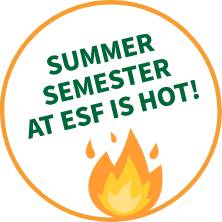Special Sessions
Our summer sessions are the perfect way to make your summer productive. We have something for everyone — offered online, on-campus, and out in the field — so you can get ahead, catch up, or learn something new.
Summer Session Dates
Registration opens for these sessions on February 1, 2026.
Maymester | May 11 – May 22 (2 weeks) | last day to add (TBA) | last day to withdraw (TBA)
Summer Session 1 | May 18 – June 26 (6 weeks) | last day to add (TBA) | last day to withdraw (TBA)
Summer Session 2 | June 29 – August 7 (6 weeks) | last day to add (TBA) | last day to withdraw (TBA)
Combined Summer Session | May 18 – August 7 (12 weeks) | last day to add (TBA) | last day to withdraw (TBA)
Tuition Liability Schedule can be found here.
Class Schedule and Course Descriptions
Cranberry Lake
View course descriptions for registration information.
Session A | May 24 - June 12, 2026
Session B | June 14 - July 3, 2026
Session C | July 5 - July 17, 2026
Session D | July 19 - August 7, 2026
Registration for the 2026 Summer Session opens February 1st.
ESF Students
Sign up through the Registrar and watch your registration status in MyESF.
Non-ESF Students
You don’t need to be a current ESF student to take a summer course.
If you are a matriculated student interested in enrolling in an internship, please complete the
Internship Registration Form located on the Registrar website and follow the instructions listed.


